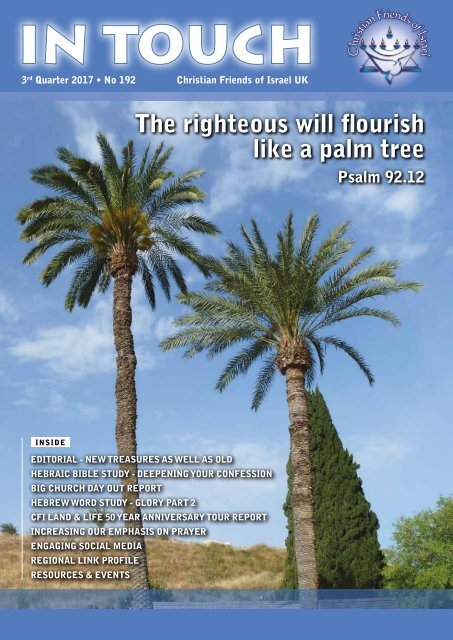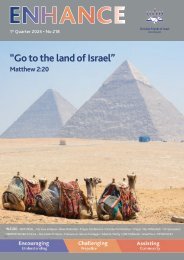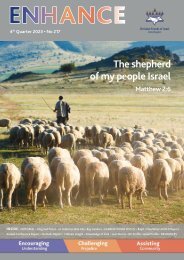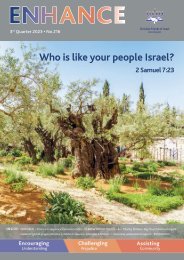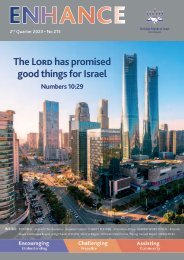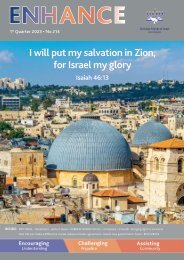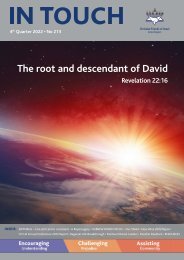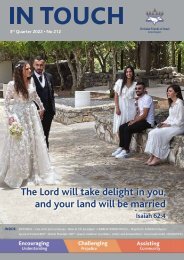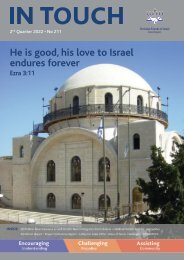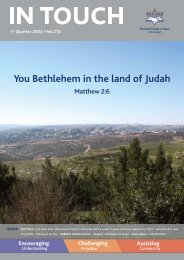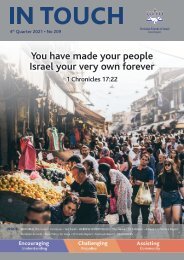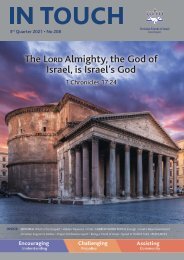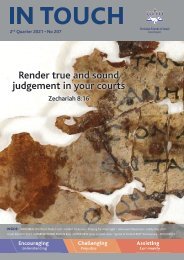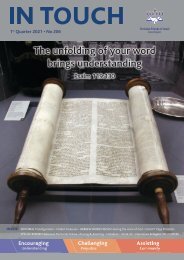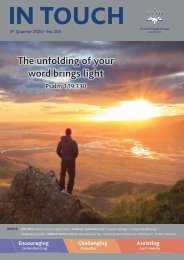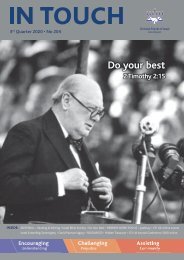In Touch Quarter 3 - 2017
CFI UK's regular quarterly magazine
CFI UK's regular quarterly magazine
Create successful ePaper yourself
Turn your PDF publications into a flip-book with our unique Google optimized e-Paper software.
3 rd <strong>Quarter</strong> <strong>2017</strong> • No 192 Christian Friends of Israel UK<br />
The righteous will flourish<br />
like a palm tree<br />
Psalm 92.12<br />
INSIDE<br />
EDITORIAL - NEW TREASURES AS WELL AS OLD<br />
HEBRAIC BIBLE STUDY - DEEPENING YOUR CONFESSION<br />
BIG CHURCH DAY OUT REPORT<br />
HEBREW WORD STUDY - GLORY PART 2<br />
CFI LAND & LIFE 50 YEAR ANNIVERSARY TOUR REPORT<br />
INCREASING OUR EMPHASIS ON PRAYER<br />
ENGAGING SOCIAL MEDIA<br />
REGIONAL LINK PROFILE<br />
RESOURCES & EVENTS
Editorial<br />
Good teachers<br />
- new treasures as well as old<br />
About us<br />
CFI-UK seeks to bless Israel by<br />
means of practical and moral<br />
support, and to serve the Church in<br />
teaching about God’s purposes for<br />
Israel and the Hebraic heritage<br />
of our faith.<br />
CFI also produces a monthly Prayer<br />
Letter, an audio Middle East News<br />
Report and distributes the Haverim<br />
Hebraic teaching CDs.<br />
Please send for full details of<br />
projects in Israel and also of the<br />
many teaching resources available.<br />
As an educational charity,<br />
we carry a variety of<br />
resources relevant to our<br />
purpose. We do not<br />
necessarily endorse every<br />
view expressed by our<br />
guest writers or authors<br />
of these resources.<br />
Published by:<br />
CFI Charitable Trust<br />
PO Box 2687<br />
Eastbourne<br />
BN22 7LZ<br />
Tel: 01323 410 810<br />
Fax: 01323 410 211<br />
Email: info@cfi.org.uk<br />
Websites: www.cfi.org.uk<br />
www.keshercourse.org.uk<br />
facebook.com/cfiuk<br />
twitter.com/cfi_uk<br />
Registered Charity<br />
No. 1101899<br />
Registered Office c/o<br />
Caladine, Chantry House<br />
22 Upperton Road<br />
Eastbourne, BN21 1BF<br />
Company No: 0498515<br />
VAT Registration No: GB678780275<br />
Front Cover Image:<br />
Palm trees, Megiddo National Park<br />
Photo: Christina Hine<br />
Jacob Vince<br />
Today we are in the privileged<br />
position of having the full<br />
canon of Scripture against<br />
which everything can be tested.<br />
As we know, the Holy Spirit guided<br />
Jesus’ apostle-disciples into ‘all truth’<br />
(John 16:13) and, in the present day, us<br />
through what they completed. Now<br />
included are things which were not<br />
revealed to some of the earlier writers<br />
(See Matthew 13:16; Hebrews 11:40;<br />
1 Peter 1:10). The imperative for us is<br />
to ‘correctly handle the word of truth’ (2<br />
Timothy 2:15), submitting ourselves to<br />
the, ‘teaching, reproving, correcting and<br />
training’ of ‘all Scripture’ (2 Timothy 3:16).<br />
<strong>In</strong> his second letter the apostle Peter<br />
states that ‘we have the word of the prophets<br />
made more certain’ (2 Peter 1:19). Of<br />
course it was already certain before,<br />
but now it is made more certain - if this<br />
is possible. How amazing is that? But<br />
Peter’s instruction which follows is<br />
equally important. First he states that<br />
‘no prophecy of Scripture came about by the<br />
prophet’s own interpretation of things. For<br />
prophecy never had its origin in the human<br />
will, but prophets, though human, spoke from<br />
God as they were carried along by the Holy<br />
Spirit’ (2 Peter 1:20-21). It is worth noting<br />
that in using the phrase, ‘no prophecy of<br />
Scripture’, Peter defines prophecy in the<br />
Bible as distinct from any other extrabiblical<br />
prophecy.<br />
Next, by way of analogy Peter uses the<br />
false prophets of old to compare with<br />
false teachers then being encountered by<br />
his readers. The phrase ‘just as’ (2 Peter<br />
2:1) indicating a comparison being made<br />
between the two different categories<br />
of communicators – ‘prophets of old’ to<br />
‘teachers’ in his day. Hence for ourselves,<br />
now with the full canon of Scripture,<br />
perhaps the emphasis shifts toward the<br />
Bible teacher rather than any prophetic<br />
gifting. <strong>In</strong> other words, today we can<br />
test everything against the full canon of<br />
Scripture, and so we should.<br />
There are those designated and gifted<br />
to teach the word (Ephesians 4:11) but<br />
they in turn should do this diligently<br />
and humbly, under Scripture not above<br />
it. They should allow the listener to<br />
discern for themselves that what is<br />
being taught is true to the Scriptures -<br />
not misinterpreting the Scriptures, not<br />
taking away anything and not adding<br />
anything, nor giving any extra-biblical<br />
teaching the authority of Scripture.<br />
As we do this we must take care not<br />
to miss out sections of Scripture which<br />
do not fit our pattern of understanding,<br />
especially the earlier writings where the<br />
temptation is to over-interpret them in<br />
light of the newer writings. That would<br />
remove from them part of their original<br />
intention – which can, and indeed has,<br />
developed into a form of Marcionism.<br />
Marcion considered the God of what he<br />
defined as the New Testament a different<br />
and superior God to that described in<br />
what he referred to as the Old Testament,<br />
an early form of ‘replacement theology’<br />
or its new derivative ‘fulfilment<br />
theology’.<br />
For example, let us consider a<br />
foundational passage which shows the<br />
strength of combining the old and new.<br />
It comes after Jesus’ teaching using a set<br />
of familiar parables including the sower,<br />
the weeds, the mustard seed and yeast,<br />
the hidden treasure, the pearl and the net<br />
of fish. Before the narrative moves on<br />
to ‘When Jesus had finished these parables’<br />
(Matthew 13:53), Jesus asks the question,<br />
‘have you understood all these things?’<br />
(Matthew 13:51) Presumably the word<br />
‘all’ refers to all the previous parables<br />
in his summing up. ‘“Yes,” they replied’<br />
(Matthew 13:51). [A bold claim]. ‘He<br />
said to them, “Therefore every teacher of<br />
the law who has been instructed about the<br />
kingdom of heaven, [the subject Jesus has<br />
been speaking about in the preceding<br />
parables], is like the owner of a house who<br />
brings out of his storeroom new treasure<br />
as well as old” (Matthew 13:52). What<br />
does this mean? Well what it clearly<br />
says is that good teachers, that is those<br />
‘instructed about the kingdom of heaven’<br />
teachers, bring out both that which is<br />
new and that which is old. New as well<br />
as old. There is no replacement. <strong>In</strong>deed<br />
the clear indication is that both hold equal<br />
value. We need both, not just as a token,<br />
but in reality.<br />
We are so quick to discard the ancient<br />
paths, whereas the Bible continually<br />
points us back to them, (see Jeremiah<br />
6:16). There are many other similar<br />
examples and perhaps we will explore<br />
these in future editorials.<br />
2 IN TOUCH • 3 rd <strong>Quarter</strong> <strong>2017</strong><br />
www.cfi.org.uk
Special Report<br />
Robin Lane<br />
God worked<br />
extra hours<br />
Air France flight 139<br />
On Wednesday 3 rd May <strong>2017</strong> more than 60<br />
guests at a church in Heathfield, East Sussex,<br />
were treated to a vivid description of what<br />
is widely known as Operation Entebbe, although<br />
the Israelis renamed it Operation<br />
Yonatan after its leader, Yonatan<br />
Netanyahu - brother of Israel’s<br />
Prime Minister.<br />
It was a daring rescue that resolved<br />
a week-long hostage crisis which<br />
captured the world’s attention as soon<br />
as Air France flight 139 was hijacked<br />
on Sunday 27 th June 1976 by two<br />
Yoni Netanyahu<br />
members of the Baader Meinhoff Group and two members<br />
of the Popular Front for the Liberation of Palestine. There<br />
were 236 passengers on board, as well as 12 crew members.<br />
After initial negotiations and a six-hour stop in Benghazi,<br />
Libya, the plane and its passengers were eventually flown to<br />
Entebbe Airport in Uganda, and held hostage there while the<br />
hijackers made their demands.<br />
Entebbe Airport, Uganda<br />
Our presenter that Wednesday evening was one of the<br />
Israeli commandos who took part in the rescue operation,<br />
so much of what he described to us was first-hand evidence.<br />
<strong>In</strong> recent years he has pulled together much additional<br />
information, so as to be able to give a very full factual account<br />
of what happened. And that account held the attention of<br />
the audience for a full two hours.<br />
He described to us the way that, after days of uncertainty,<br />
the Israelis’ initial hopes that Air France and the French<br />
Government would resolve the situation had disappeared.<br />
Just 140 hostages were flown back to Paris late on the<br />
Wednesday, none of them Jewish. Then slowly there came<br />
the realisation that direct negotiation would not resolve it<br />
either. The Israeli Government concluded that if they did not<br />
act, the remaining hostages would all die. Thus the chosen<br />
group of soldiers and airmen were finally given the order to<br />
‘go’ on Saturday 3 rd July 1976.<br />
Three Hercules aircraft took off from Israel with around 200<br />
soldiers, 8 aircrew and 8 cars. They were accompanied by a<br />
fourth Hercules that was empty apart from its aircrew and<br />
some medical staff – ready to transport the hostages back to<br />
Israel. They were only given the final order to continue with<br />
the operation at 6:30pm – whilst already in flight towards<br />
Uganda!<br />
The flight took a total of 10 hours and they experienced a<br />
lot of turbulence because of flying at low altitude to avoid<br />
detection by radar. So there was much air sickness! They<br />
even had to press on for three hours through a tropical storm<br />
before reaching Entebbe Airport. So it was an immense relief<br />
to the soldiers when they finally landed, got out of the planes<br />
and went into action.<br />
That action lasted for less than an hour. Yet there were<br />
several points at which their plan seemed to go wrong, such<br />
as an initial burst of gunfire to silence a couple of Ugandan<br />
soldiers guarding the route to the terminal building. There<br />
was also trouble when the fourth Hercules plane sank into<br />
the ground at the side of the runway as the pilot turned it to<br />
pick up the hostages.<br />
But despite these problems the Israelis rescued most of the<br />
hostages – all but three who died in the gunfire and one who<br />
later died in the local hospital where she had been treated for<br />
an illness. All the terrorists were killed in the rescue, as were<br />
around 20 Ugandan soldiers who were acting in support of<br />
the terrorists at the command of their unpredictable dictator,<br />
Idi Amin. The one Israeli soldier who died in the rescue was<br />
Yonatan Netanyahu, the operation’s leader.<br />
Finally came the long return flight, which saw many of the<br />
soldiers and hostages sleep from sheer exhaustion – despite<br />
the lack of comfort in the Hercules transport aircraft. They<br />
arrived back in Israel on Sunday 4 th July to be welcomed<br />
as heroes. It was a major setback for the terrorists of the<br />
day. More than 100 hostages had been rescued without the<br />
terrorists’ demands being met, and all the terrorists were<br />
killed.<br />
Hostages celebrate their return to Israel<br />
It was astonishing that such a risky rescue operation<br />
had been carried out successfully. <strong>In</strong> the final words of the<br />
presenter that evening in Heathfield, success was made<br />
possible because “God had worked extra hours!”<br />
facebook.com/cfiuk twitter.com/cfi_uk 3 rd <strong>Quarter</strong> <strong>2017</strong> • IN TOUCH 3
Hebrew Word Study<br />
Melissa Briggs MA,<br />
Hebrew University of Jerusalem,<br />
Melissa is an experienced Hebrew<br />
teacher with a desire to make the<br />
rich language of the Scriptures<br />
accessible to Christians.<br />
God is worthy of all kavod. <strong>In</strong> Part 1 we explored<br />
the Hebrew word family around kavod<br />
and defined it as the public demonstration<br />
of God’s awesome greatness. It is God’s amazing<br />
character, beauty, weightiness, and power made<br />
visible and known. Jesus is the perfect reflection of<br />
God’s kavod.<br />
Amazingly, the Scriptures also indicate the ability for<br />
mankind, and indeed all of creation to reflect God’s kavod too.<br />
What a privilege and responsibility!<br />
How can creation reflect God’s kavod?<br />
Creation displays the kavod of the Lord in the amazing<br />
beauty and intricate systems God has put into place.<br />
Consider, for example, the precisely balanced food chains,<br />
the marvels of the water cycle, and the miracle of the body’s<br />
ability to grow and heal. God perfectly designs, orchestrates,<br />
and sustains the wonders of the created order.<br />
The visible order and beauty speak of the ingenuity and<br />
wisdom of the Creator and display God’s greatness in a<br />
public way for all to see. No one can say the Creator God did<br />
not show himself (see Romans 1:20-21).<br />
Though creation is fallen because of sin, it is still capable of<br />
reflecting God’s glory and making him known: “The heavens<br />
declare the kavod of God; and the firmament shows his handiwork…<br />
There is no speech nor language where their voice is not<br />
heard. Their line has gone out through all the earth, and<br />
their words to the end of the world” (Psalm 19:1-4).<br />
How can mankind reflect God’s kavod?<br />
The Lord bought our bodies with a price, and<br />
now we can be vessels through which his life,<br />
character, and power shine forth for his glory<br />
(see 1 Corinthians 6:20; Galatians 2:20). We are created in<br />
his image after all. When we accept praise or attention for<br />
ourselves, then we place the recognition and acclaim in the<br />
wrong direction (see Proverbs 25:6-7). Our Creator deserves<br />
the credit for all our beauty, goodness, gifts and talents (see 1<br />
Thessalonians 2:12). Are we willing to let our lives be mirrors<br />
where God can exhibit his kavod? (see 2 Corinthians 3:18).<br />
God’s good plan involves using mankind to reflect his<br />
kavod. When we show the world how satisfied we are in<br />
him—expressing that God is more fulfilling and better than<br />
all this world has to offer—then God is beautifully glorified<br />
through our lives.<br />
A practical example of a Hebraic worldview<br />
<strong>In</strong> Part 1 we asked the question: What would it look like to<br />
eat and drink to the kavod of God? (see 1 Corinthians 10:31).<br />
Traditionally, Greek thought emphasises the separation<br />
between the holy and the mundane. And what is more<br />
‘mundane’ than food? But the Hebrew Scriptures describe a<br />
God who cares about every aspect of the lives of mankind.<br />
He is not a controlling dictator, but a caring Father. When<br />
God gave his life-giving instruction to the Jewish people,<br />
he lovingly trained them on everything from bathing, to<br />
dressing, to bodily functions, to tattoos, to sexuality, to<br />
Glory<br />
PART 2<br />
We glorify<br />
God in our<br />
daily lives<br />
כָּבֹוד<br />
Part 1 was published in issue 191 which is<br />
available on the CFI-UK website<br />
employment, to finances, to farming, to family life, and yes —<br />
to food. (<strong>In</strong>terestingly, the very first sin in the Bible involved<br />
food!)<br />
As a mother I care about what my children eat because I<br />
love them and I want the best for them. I know firsthand<br />
that their mood, concentration, energy levels and overall<br />
health for the day — and for the long term — will fare better<br />
if they eat things like scrambled eggs, porridge and bananas<br />
for breakfast, rather than a bowl of sweeties! But do I love<br />
them any less if they choose Coco-Pops for breakfast at a hotel<br />
buffet, rather than a fruit salad? Of course not! This parental<br />
instinct gives us a taste of God’s viewpoint on our diet.<br />
God is the one who made food, created our need and<br />
appetite for it, and continually provides it (see Psalm 136:25).<br />
God created food for the good of mankind (see Genesis 1:29-<br />
31). The array of colours, tastes, textures, and flavours of food<br />
are unmistakably a gift from the generous and creative hand<br />
of God. He did not have to create us with taste buds, but<br />
thankfully he did! God designed food to be enjoyed.<br />
Let us stop and acknowledge how abundantly blessed we<br />
are to have food, especially when so many around the world<br />
struggle with famines and starvation. So often we take food<br />
for granted when food is meant to make us turn to God in<br />
praise and thanksgiving. We are meant to be generous with<br />
our food, to share it, and to look after the poor, not<br />
to be wasteful or selfish.<br />
When we view and use food according to the<br />
way that God intended, following the example<br />
of Jesus, we glorify God in our daily lives as<br />
we point to him as the Creator, Sustainer, and<br />
Provider. God designed proper interaction with<br />
food to inherently bring him glory!<br />
God intends food to give us nourishment, energy,<br />
sustenance and nutrition. When we consistently eat foods that<br />
neglect to accomplish those aims (such as highly-processed,<br />
refined foods that drain energy and lack nutrition), then we<br />
miss out on the opportunity to live out God’s good plan for<br />
the watching world to see. How often do we eat unhealthy<br />
food that diminishes our body’s health rather than optimise<br />
it? Do we eat in light of the truth that our body is a temple for<br />
the Holy Spirit? (see 1 Corinthians 6:19-20).<br />
What else did God intend food to do? God designed food<br />
to foster fellowship. He intended eating to be an opportunity<br />
to receive good gifts from the Father with thankfulness.<br />
Food and drink are to be a tangible way we can show God’s<br />
generosity to others (see Matthew 10:42; John 6:9). Mealtimes<br />
can foreshadow the Marriage Supper of the Lamb, and can<br />
be a time to remember that Jesus gave his body and blood for<br />
the redemption of mankind (see 1 Corinthians 11:24). Hunger<br />
is a physical pang in our body for sustenance which mirrors<br />
our spiritual need for ‘daily bread’ from the Lord (see Psalm<br />
42:1-2).<br />
How did Jesus interact with food as he daily came into<br />
contact with it? He thanked God for it. He provided it for<br />
hungry people. He fasted. He knew that man could not live<br />
4 IN TOUCH • 3 rd <strong>Quarter</strong> <strong>2017</strong><br />
www.cfi.org.uk
on bread alone. He ate when others expected him to fast. He<br />
blessed it. He cooked for others and invited them to eat. He<br />
believed God could multiply it. He shared it. <strong>In</strong> following<br />
Jesus’ example we can glorify God in our eating and drinking.<br />
God’s provision for our food does not start at the<br />
supermarket, or on the day we eat it. Amazingly, it starts<br />
months or years beforehand when the potatoes were planted<br />
in Ireland, or a farmer in Spain sowed the tomato seeds<br />
and reaped the harvest after months of labour. Perhaps the<br />
chickens were laid as eggs at a local farm and lovingly reared,<br />
fed and watered by a farmer; or a cow was conceived, born,<br />
and reared for two years as it grew to full maturity. Every<br />
plate of food tells a story of provision, growth, and love. How<br />
awe inspiring to contemplate the thought, time and care God<br />
has put into my ‘daily bread’!<br />
We are graciously given so much freedom in our food<br />
choices (see 1 Corinthians 10:23-27). But does God care more<br />
about our heart attitude or about what we actually eat? Health<br />
fanatics may eat only organic ‘superfoods’, and yet perhaps<br />
it is all about their own glory in having the ‘perfect body’?<br />
(Though eating mostly whole, natural foods means that we<br />
are sticking to God’s original design for that food, where<br />
nutrients and the equilibrium of things like fibre and amino<br />
acids are kept in balance). Two people might eat exactly the<br />
same foods for a week, but one could do it for God’s glory<br />
with a thankful heart, and one could do it with a self-obsessed<br />
attitude. Daniel’s attitude towards food is certainly worth<br />
studying.<br />
God loves to be in daily conversation with us. Would he<br />
rather we eat a slice of cake with gratitude from the hand of<br />
someone who lovingly prepared it, than to offend someone<br />
for the sake of never eating a spoonful of sugar? Ask him!<br />
(see 1 Timothy 4:1-4).<br />
Many people treat physical urges as irresistible, but we are<br />
to be ruled by the Spirit, not our flesh (see Galatians 5:15, 22-<br />
24). <strong>In</strong> the book of Genesis, God gave mankind dominion<br />
over creation — including fruits, vegetables, plants and<br />
animals — not creation dominion over mankind. Therefore,<br />
we do not need to be dominated by things in creation like the<br />
sugar cane plant, or the cocoa plant, or the tobacco plant, or<br />
potatoes (vodka), or grapes (wine).<br />
We display God’s kavod when we keep things in their<br />
rightful, God-given place. It is so easy to make an idol out<br />
of food by giving it roles and responsibilities it was never<br />
intended to bear, or by placing an inordinate emphasis or<br />
affection on food. God did not design food to be our Saviour<br />
and Comforter. He intended Jesus and the Holy Spirit to<br />
fulfil those roles. Eating in order to numb our emotions, or<br />
because we feel angry, stressed, scared, or bored fails to bring<br />
glory to God. Looking to God for help in all of these scenarios<br />
brings him glory. “I will be fully satisfied [in God] as with the<br />
richest of foods; with singing lips my mouth will praise you” (Psalm<br />
63:5).<br />
Thankfully we are not left alone to navigate our interaction<br />
with food (see John 14:26). We can ask God for help one meal<br />
at a time. “So whether you eat or drink, or whatever you do, do it<br />
all for the kavod of God” (1 Corinthians 10:31), because God<br />
certainly deserves all the glory!<br />
Learn Hebrew with Melissa at: www.explorehebrew.co.uk<br />
Report<br />
By Julia Soakell<br />
Big Church Day Out is a Christian extravaganza of family<br />
fun and music with many successful years of events in the<br />
south at East Witton, Sussex. This year CFI’s stand was<br />
staffed by Steve Hailes and Ruth Henderson plus new staff<br />
member Anne Scott and volunteers Ruth and Robin Foster.<br />
But this year CFI were also at the first Big Church Day Out in<br />
the North – held in Cheshire in the grounds of Capesthorne Hall, a<br />
beautiful stately home in the area around Alderley Edge.<br />
CFI Resources were also available at both sites, where we<br />
were able to help people make good choices for studying the<br />
Bible and gaining greater insight to the subject. We were<br />
able to chat with lots of youngsters and young adults about<br />
our Facebook page and Twitter feed, as well as encouraging<br />
them to attend our National Conference. It was great to see<br />
these young people who had been nurtured in their understanding<br />
by good churches, leaders and families to whom we are all indebted.<br />
We must pray that we can continue to make great connections with the<br />
youth of the UK churches, fellowships and Christian Unions in these<br />
days and use social media where necessary to do this. 90% of 16 – 35<br />
year olds now use either Facebook, Twitter or <strong>In</strong>stagram. Big Church<br />
Day Out has a great draw to this age group as a massive array of music,<br />
artists and entertainers perform through the day from late morning<br />
until After Hours, when the Comedy Tent hosts acts well into the night.<br />
This year’s artists included Tim Hughes, Drakeford, Chip K, Mary Mary,<br />
Casting Crowns, Lou Fellingham and Kings Chambers Orchestra; as<br />
well as comedy acts like John Archer and Tim Vine, and many more<br />
performing on six different stages.<br />
The Market Place, in a huge marquee, the location of our resources<br />
stall, was visited by some of the 10-15,000 visitors to the event, held<br />
on Friday 2 nd and Saturday 3 rd June. Alongside the 60+ other stalls<br />
for Christian gifts and services, charities and missions, were three other<br />
Israel-related ministries with whom the team, David and Julia Soakell,<br />
were able to share good fellowship and recommend each other’s stalls.<br />
Families came to the stand and asked questions about the shofar on<br />
display. Lots of free CFI literature was distributed and we were able to<br />
have conversations about the heritage of our Judaic Christian faith, and<br />
the blessing of being able to be enriched by Gods heart for Israel, her<br />
people and her land.<br />
facebook.com/cfiuk twitter.com/cfi_uk 3 rd <strong>Quarter</strong> <strong>2017</strong> • IN TOUCH 5
Hebraic Study<br />
James Whitman<br />
serves as president<br />
of The Centre for<br />
Judaic-Christian<br />
Studies (JC Studies)<br />
Our first confession of Jesus<br />
is the beginning of faith,<br />
not the end. Faith can<br />
mature — indeed it must. How<br />
blessed are those that discover<br />
how it grows!<br />
There was an inventor in my<br />
hometown of Dayton, Ohio, named<br />
Charles Kettering. <strong>In</strong> 1912 he solved the<br />
problem of hand cranking an automobile<br />
engine by inventing the self-starter,<br />
generator and lighting system still in use<br />
today. His perspicacity is legendary and<br />
reflected in quotes like this one, “There is<br />
a great difference between knowing and<br />
understanding. You can know a lot about<br />
something and not really understand it.”<br />
How very appropriate for our subject.<br />
Jesus is with us and desires to deepen<br />
our confession of him as Messiah (Christ)<br />
and King (Lord) — without which we<br />
are like a kite with a severed string. To<br />
learn how, we must use our imagination<br />
and, with humility, participate in a<br />
discipling discussion by hearing anew<br />
questions that are as relevant now as<br />
they were when he first asked them over<br />
two-thousand years ago. “Who do people<br />
say that the Son of Man is?” (Matthew<br />
16:13) Jesus begins, referring to himself<br />
in that uniquely biblical way. A better<br />
understanding of this story recorded in<br />
Matthew can help strengthen our resolve<br />
to follow the Master like our forbears in<br />
the faith.<br />
Location One:<br />
The Geography and Sociology<br />
There is a persistent myth that Jesus<br />
wandered Israel randomly, an idea<br />
wholly inconsistent with the eyewitness<br />
accounts that show the intentionality of<br />
his every move. The prophet Yeshua<br />
(Jesus), though calm and unhurried,<br />
exhibits the zeal of a Jewish missionary:<br />
he covers the population centres of an<br />
entire country including smaller villages,<br />
he returns to areas where his message is<br />
bearing fruit, and he avoids cities that<br />
flaunted Roman hegemony like Tiberius<br />
and Sepphoris. Experts estimate that<br />
Jesus could have easily covered over<br />
15,000 miles by foot during his lifetime<br />
(Merilyn Hargis, Christianity Today).<br />
“Jesus went throughout all the cities and<br />
villages, teaching in their synagogues and<br />
proclaiming the gospel of the kingdom and<br />
healing every disease and every affliction”<br />
(Matthew 9:35).<br />
<strong>In</strong> his divine vocation as Israel’s<br />
Deepening Your<br />
Confession of Christ<br />
Messiah, Jesus fulfilled his commission<br />
to take the good news “to the lost sheep of<br />
the house of Israel” (Matthew 15:24). We<br />
now find him and his disciples near the<br />
headwaters of the Jordan River, the area<br />
of Caesarea Philippi in the northernmost<br />
region of the Holy Land. The location<br />
is rugged yet tranquil, perfect for soulsearching<br />
which the Master initiates<br />
by having his men identify the cultural<br />
clutter. “And they said, ‘Some say John<br />
the Baptist, others say Elijah, and others<br />
Jeremiah or one of the prophets’” (Matthew<br />
16:14). This small group exercise has<br />
meaning for all of God’s people, in every<br />
time and place. <strong>In</strong> your context, who do<br />
people say that Jesus is?<br />
Location Two: The Biblical Context<br />
Matthew’s Gospel narrative, like<br />
the life of his Lord, is characterised<br />
by purposeful design. Both lead us<br />
to a crucial turning point in history.<br />
Matthew uses a little phrase twice —<br />
literally, “from that time began Jesus”— to<br />
help us see the big picture arrangement<br />
of his book. The first use inaugurates<br />
Messiah’s ministry, “From that time<br />
Jesus began to preach, saying, ‘Repent for<br />
the kingdom of God is at hand’” (Matthew<br />
4:17). The second use inaugurates<br />
Messiah’s passion, “From that time Jesus<br />
began to show his disciples that he must go<br />
to Jerusalem and suffer many things from<br />
the elders and chief priests and scribes, and<br />
be killed, and on the third day be raised”<br />
Part 1 of 2<br />
(Matthew 16:21). The question and<br />
answer conversation we are observing is<br />
the link that connects the two parts.<br />
Think about the great significance<br />
of this scene. Jesus is preparing his<br />
followers to carry on his life’s work<br />
because his care for God’s flock is<br />
leading to his final destination, “the city<br />
of the Great King” (Matthew 5:35). And<br />
so, in classic Jewish style, he follows his<br />
general question with a more specific<br />
one, “But who do you say that I am?”<br />
(Matthew 16:15). An inspired answer<br />
from the student inspires an even more<br />
profound response from the teacher (see<br />
Matthew 16:16-19). No doubt you are<br />
familiar with all of this. We will unpack<br />
some of the theological wonders in this<br />
dialogue in my next article. But for now,<br />
I have some modest questions of my<br />
own: Why here? Why now? Why these<br />
particular questions?<br />
Why here?<br />
What we know for certain is that<br />
Jesus chose this location. From a<br />
geographical perspective, they are near<br />
the headwaters or source of the Jordan<br />
River, whose waters give life to all of<br />
Israel. From a sociological perspective,<br />
they are in the territory allotted to the<br />
tribe of Dan (from whence the Jordan<br />
derives its name when combined with<br />
the Hebrew ‘yadar’ which means to<br />
descend or flow down). This area carries<br />
special significance because Jeroboam<br />
built a temple here to ensure that the<br />
ten northern tribes of Israel would not<br />
reunite with the two southern tribes after<br />
the tragic split under King Solomon’s<br />
son Rehoboam. <strong>In</strong> another approach<br />
to understanding Matthew’s Gospel, a<br />
fascinating pattern emerges; not only is<br />
Jesus her rightful king, but he embodies<br />
the nation of Israel. Perhaps starting his<br />
journey from this strategic location also<br />
serves to illustrate the reconciliation of<br />
the twelve sons of Jacob.<br />
Why now?<br />
There is no need for conjecture here<br />
because, as we have seen, Matthew<br />
organises his book around the answer to<br />
this question (see Matthew 16:21). The last<br />
summer of his life is drawing to a close,<br />
and it is likely that they are in or near<br />
the month of ‘Elul’. According to Jewish<br />
tradition, the thirty days of Elul are set<br />
apart to contemplate and prepare for<br />
the biblical ‘autumn’ festival period of<br />
Trumpets and Tabernacles, punctuated<br />
by the solemn and soul-searching Day<br />
6 IN TOUCH • 3 rd <strong>Quarter</strong> <strong>2017</strong><br />
www.cfi.org.uk
of Atonement (see Leviticus 23:23-43).<br />
<strong>In</strong>terestingly, it is on the joy-filled last<br />
day of the Feast of Tabernacles that<br />
Jesus stands up and declares himself the<br />
source of living water for all humanity<br />
(see John 7:38).<br />
Why these particular questions?<br />
<strong>In</strong> most modern educational systems,<br />
questions posed by a superior are<br />
primarily an assessment tool, a way to<br />
measure what you do or do not know.<br />
<strong>In</strong> the best of Jewish tradition, questions<br />
are used to provoke deeper thinking and<br />
understanding in the student, leading<br />
to responsibility, repentance, and right<br />
living. This kind of healthy, relational<br />
dialectic is designed to train the student<br />
how to think. The learner, in this<br />
paradigm, must go deeper than knowing<br />
about something, moving towards<br />
understanding and wisdom. It is the<br />
way of a parent with a child.<br />
Jesus — who is the Son of our good<br />
Father as Peter’s confession reminds us<br />
(see Matthew 16:16) — understands that<br />
he must leave as part of God’s plan, one<br />
that his men cannot grasp ... yet. He is<br />
wise that in our weakness we are easily<br />
corrupted, proven by the very next thing<br />
we hear Peter say (see Matthew 16:22).<br />
But failure is part of the curriculum, and<br />
the most remarkable part of this story<br />
for me is that in the short time left he<br />
successfully equips his faithful disciples<br />
to navigate the coming storm. “I have not<br />
lost one of those you gave me” (John 18:9).<br />
How does he do this? Or said another<br />
way, what resources does Jesus expect<br />
his disciples to draw from to gain<br />
insight into the core question of his<br />
identity? If you responded, “the Bible,<br />
or God’s word,” then you get a gold<br />
star. But remember, we want our faith to<br />
mature, and for that to happen we must<br />
go beyond merely knowing the right<br />
answer. The heart-level question every<br />
person wants to know is, “What is God<br />
like?” The biblical answer to that honest<br />
inquiry is the only anchor that holds<br />
against the challenges we face in a fallen<br />
world. Jesus came to show us the Father.<br />
The Father reveals himself by showing<br />
us the Son. All of this is a work of his<br />
Spirit.<br />
<strong>In</strong> light of the above, here is my attempt<br />
to answer the question of how Jesus<br />
equipped his disciples. He taught them<br />
that deepening their understanding of<br />
what they know about God requires<br />
the Father to teach them about his Son,<br />
through his word, played out in their life<br />
experiences.<br />
Where did I get these ideas? The same<br />
place Jesus did, from his Father. <strong>In</strong> a<br />
story so critical that Matthew, Mark, and<br />
Luke all record it, Jesus joins John at the<br />
Jordan River to submit to baptism in one<br />
of those embodying-Israel moments, “it<br />
is fitting for us to fulfil all righteousness”<br />
(Matthew 3:15). When Jesus emerges<br />
from the water, three big things happen<br />
in succession: there is a dramatic event<br />
in the sky, followed by the Spirit of God<br />
descending on him, concluding with a<br />
voice out of the newly opened heavens<br />
(Matthew 3:16-17). The voice says, “This<br />
is my beloved Son, with whom I am well<br />
pleased” — breathtaking!<br />
At the public presentation of Jesus,<br />
the very inauguration of his ministry,<br />
the God of Abraham, Isaac, and Jacob<br />
addressed the “Who do you say that I<br />
am?” question (Matthew 16:15). His onesentence<br />
encouragement to Jesus is a<br />
portal into profound truths that deepen<br />
faith. “This is my beloved Son,” alludes to<br />
Psalm 2:7; “with whom I am well pleased,”<br />
refers to Isaiah 42:1. Psalm 2 is a poetic<br />
reflection on the messianic king in 2<br />
Samuel 7, whilst Isaiah 42 is a prophetic<br />
summation of the messianic kingdom,<br />
the great hope of the Hebrew Bible (Old<br />
Testament). Each of these messianic<br />
texts is a portal into deep truths about<br />
Jesus that shine fresh light on his deeds<br />
and his words. We are to build our lives<br />
on his words, because he is God’s word<br />
made flesh.<br />
CFI-UK REGIONAL LINK PROFILE<br />
Christian Friends of Israel would like to welcome on board<br />
our latest Regional Link – Glynis Brookes – who will look<br />
after York and the surrounding areas.<br />
Glynis is a teacher by profession, latterly<br />
working as an advisory teacher for young<br />
children with Special Educational Needs<br />
(SEN) and regularly delivering training to<br />
teachers and other professionals. She has<br />
held various leadership positions in the<br />
church, preaching God’s word and working<br />
for several years as a volunteer speaker for<br />
Open Doors, a Christian charity which serves<br />
the persecuted church worldwide in places<br />
where faith costs the most.<br />
Glynis writes ‘My road to a personal faith<br />
in Jesus and the unfolding of his word and<br />
purposes has been a journey that has been<br />
exciting and challenging and continues to be<br />
so.<br />
I was raised in a caring but non-<br />
Christian home and had little knowledge<br />
of the Bible or Jesus except that gained<br />
through the occasional assembly or RE lesson at school. Whilst<br />
studying at university I had many interesting, and some very<br />
heated, conversations with the ‘God squad’ (born again believers),<br />
verbally disagreeing with them on occasions about their views, but<br />
quietly gaining interest as I reflected on what they had said – the<br />
Scriptures particularly reverberating in my heart. Through his<br />
word and Spirit, God was working in me. But it took a few more<br />
years, after other key encounters with Christians, before I asked<br />
Jesus into my life. What a turnaround! I became a member of the<br />
‘God squad’ myself!<br />
YORK & AREA – by CFI’s David Soakell<br />
From the earliest days of my conversion I had a strong desire<br />
to know the truth. God’s word became very dear to me. He led<br />
me to Bible College and the years of study there reinforced my<br />
love of Scripture. However, looking back,<br />
my understanding of Israel and his people<br />
at that time remained unclear until slowly<br />
he unfolded his word. Then my love for his<br />
people and understanding of his plans and<br />
purposes became more relevant to me. I<br />
have visited Israel several times over the<br />
last six years, with the last visit being for<br />
an extended 7-week period which included<br />
outreach work alongside some Messianic<br />
believers and visiting key sites in the land,<br />
including those which are of future prophetic<br />
significance.<br />
Standing in modern Israel with the Bible in<br />
one hand, a camera in the other and relating<br />
the two is exciting! As at the beginning of my<br />
journey of faith, I continue to have a desire<br />
to know the truth. The Bible says that the<br />
last days will be ones where deception abounds (Matthew 24:5,<br />
24; 2 Thessalonians 2:9-10) and I am keen to not be deceived<br />
myself, but also to share God’s word with others as he provides the<br />
opportunity, including his plans for Israel and his people, as well as<br />
helping people to see through popular media sound bites and halftruths,<br />
and to pray for the land.’<br />
If you would like Glynis to speak in your fellowship regarding<br />
CFI-UK, then please email her at:<br />
gbrookes3@hotmail.com or phone her on: 07763 059210<br />
facebook.com/cfiuk twitter.com/cfi_uk 3 rd <strong>Quarter</strong> <strong>2017</strong> • IN TOUCH 7
Report<br />
CFI Land and Life Jerusalem<br />
Jubilee 50 year Anniversary Tour<br />
A<br />
group of over twenty participants left via EL<br />
AL airlines, arriving early evening at Golden<br />
Crown Hotel Nazareth, an ideal staging post<br />
from where to explore the north of Israel and Galilee.<br />
The programme contained some more conventional pilgrim<br />
sites, but also focused on the campaigns during the First<br />
World War (when the British and Allied forces ended the<br />
400-year Turkish Ottoman occupation in 1917), Israel’s War of<br />
<strong>In</strong>dependence in 1948, the Golan campaigns of 1967 and 1973,<br />
and 50 th anniversary of the 1967 reunification of Jerusalem,<br />
plus some of the contemporary security challenges.<br />
the Golan Heights viewing point looked down on the Hula<br />
valley where Syria located its military base prior to 1967.<br />
Moving down the coast, after Caesarea we visited the<br />
<strong>In</strong>dependence Hall in Tel Aviv where the re-born State of<br />
Israel was declared by Ben Gurion, then on to Emmanuel<br />
House, former home of Baron Ustinov, viewing their<br />
Tel Sheva Memorial<br />
Hula Valley Nature Reserve<br />
Highlights in northern Israel on the first two days included<br />
viewing the recently uncovered first century synagogue at<br />
Magdala, walking through the Hula Valley Nature Reserve<br />
and later the narrow alleys of Safed. On the military side, we<br />
viewed Syria from the nearest location to the border and from<br />
Caesarea coastline<br />
collection of lantern slides showing the history of Old Jaffa,<br />
where we later walked.<br />
<strong>In</strong> Jerusalem we stayed at Rimonim Hotel, from where<br />
we visited the Allenby Memorial and Commonwealth War<br />
cemetery. The next day we went south to Beersheba – and<br />
the Tel Sheva memorial – site of a significant battle at the<br />
time of the Balfour Declaration. We laid flowers at the<br />
Commonwealth war cemetery there, before travelling across<br />
to Sderot and a Gaza viewing site. Returning via Latrun,<br />
location of a British built police fort which was circumvented<br />
Beersheba Cemetary<br />
The tour group at Abraham’s Well<br />
All photos courtesy of: Christina Hine<br />
8 IN TOUCH • 3 rd <strong>Quarter</strong> <strong>2017</strong> www.cfi.org.uk
Nabi Samuel viewpoint<br />
during the 1948 War of <strong>In</strong>dependence to maintain the supply<br />
line to Jerusalem from Tel Aviv, we climbed up to Nabi<br />
Samuel strategic viewpoint, where historically pilgrims<br />
would view Jerusalem from a distance for the first time –<br />
such locations at the time known as Mount Joy.<br />
Those who stayed for the CFI Jerusalem conference had<br />
the enormous privilege of observing great enthusiasm for<br />
the re-unification of Jerusalem and access to worship at the<br />
Western Wall after nineteen years of Jordanian occupation,<br />
as well as excellent Bible teaching and modern political<br />
analysis.<br />
The tour was timely, educational and spiritually uplifting<br />
for all who came. There were on-location talks at the<br />
Synagogue of Capernaum and Caesarea, where two gentile<br />
Centurions were highly commended for their support of the<br />
Jewish people and nation, both great examples for Christian<br />
Friends of Israel today; and at the Garden Tomb a talk<br />
overviewing the much needed Christian testimony in the<br />
days in which we live.<br />
All returned with fresh enthusiasm to share what they had<br />
learned with fellow Christians and continue their learning<br />
and practical outworking back home in the UK. We look<br />
forward to meeting up at the CFI UK National Conference<br />
in September. Next year there is a CFI Jerusalem conference<br />
taking place during the 70 th year of the establishment of the<br />
State of Israel, when we hope to arrange a tour in conjunction<br />
with the conference – further details will be provided once<br />
known.<br />
Western Wall Plaza<br />
Recently, CFI’s David & Julia Soakell have been<br />
touring the UK speaking at various places including<br />
several dates in the North of England; three days in<br />
Norfolk, and a conference on the Isle of Wight.<br />
The main theme of the<br />
talks centred on the issue<br />
of Jerusalem. As Israel’s<br />
Communications Minister, Tzachi<br />
Hanegbi, stated in Washington<br />
recently, “Moral claims to the land [of<br />
Israel] come from the Bible, not Google<br />
or Wikipedia.” Tzachi Hanegbi was<br />
speaking at an event held in support<br />
of placing what are alleged to be ‘West<br />
Bank settlements,’ or rather Jewish<br />
Communities, within final borders of<br />
the Jewish state of Israel. As the nations<br />
of the world increase unfair pressure<br />
upon Israel, the City of Jerusalem is<br />
returning to centre stage in world<br />
history. One of the questions David<br />
posed in his talks was, “Are we close<br />
to the words of Zechariah chapters 12<br />
& 14 coming to pass?” (‘All nations will<br />
gather against Jerusalem’ Zechariah 12:3).<br />
At the conference on the Isle of<br />
Wight, Julia spoke on a ‘Heart for a<br />
Generation’ which included updates<br />
and answers to prayer. David<br />
concentrated his talks on how 2016 had<br />
been a year of great uncertainty. He<br />
looked at the way in which the Syrian<br />
conflict saw the historic city of Aleppo<br />
Taking the word<br />
around the UK<br />
slip further into peril; commented on<br />
Brexit, Donald Trump, and challenged<br />
the audience regarding the attempts<br />
to erase Jewish history in Jerusalem,<br />
and other parts of Israel, through the<br />
United Nations Educational, Scientific<br />
and Cultural agency, UNESCO.<br />
David stated, “Throughout 2016,<br />
religious and ethnic cleansing<br />
continued as it has for many years in<br />
the Islamic Middle East in general, and<br />
Syria in particular. Islamic group ISIS<br />
have killed multitudes of Christian<br />
and other minorities; and in Syria,<br />
Shia Muslims joined Alawite Muslims<br />
to exterminate Sunni Muslims, yet<br />
the United Nations have done very<br />
little about it. The United Nations not<br />
only appeared to ignore the issue with<br />
Syria, but focused their condemnation<br />
on the world’s only Jewish state,<br />
Israel – a country that has nearly 2<br />
million Arabs and the one place in<br />
the Middle East where Muslims are<br />
safe. All the while, Mahmoud Abbas’<br />
Palestinian Authority demanded the<br />
UN acknowledge the Temple Mount<br />
and the Western Wall in Jerusalem’s<br />
Old City as having no historic ties to<br />
Judaism.”<br />
David then challenged the Christian<br />
audience that if the UN agreed that<br />
the Temple Mount and the Western<br />
Wall were exclusively Islamic and<br />
had nothing to do with Judaism, they<br />
were declaring that the Gospel writers<br />
were wrong, and by implication all<br />
the New Testament is untrue, as Jesus<br />
could not have done what the Bible<br />
proclaims he did in Jerusalem’s Temple<br />
courts. Showing through archaeology,<br />
and taking the audience on a pictorial<br />
journey through the Western Wall<br />
tunnels and the Southern Wall’s ancient<br />
steps (that date back to Herod’s Temple<br />
and beyond), David enabled the<br />
audience to see the importance of the<br />
truth, and how we needed to act and<br />
pray against these actions by the UN in<br />
dismissing Israel’s biblical history<br />
All the talks at St Paul’s Church,<br />
Newport, Isle of Wight, can be heard<br />
on MP3 at http://www.stpaulsbarton.<br />
co.uk/ . To watch one of the talks from<br />
an earlier event go to https://www.<br />
youtube.com/watch?v=z7Bd04Vy1sw<br />
facebook.com/cfiuk twitter.com/cfi_uk 3 rd <strong>Quarter</strong> <strong>2017</strong> • IN TOUCH 9
FEATURE<br />
Julia Soakell<br />
<strong>In</strong>creasing our<br />
emphasis on prayer<br />
“Prayer does not fit us for<br />
the greater work; prayer is<br />
the greater work.”<br />
Oswald Chambers<br />
The legacy of decades of faithful prayer for Israel and<br />
CFI is being seen in the prayer groups and churches<br />
of the nation, even as the absence of absolute truth,<br />
godly wisdom and discernment are seen in so many church<br />
activities, politics and thinking. Many of us cry out for<br />
a greater hunger for the word of God in our churches;<br />
for the revelation of God’s purposes for Israel, and for an<br />
understanding of the Hebraic heritage of our faith to be<br />
given to our leaders, both nationally and in the churches.<br />
We believe that God is faithful and has given us the<br />
privilege of prayer – prayer is the key.<br />
Here at CFI we want to encourage all our supporters to<br />
ask for guidance from the Holy Spirit on how to pray about<br />
these matters and with whom to pray. We ask the Lord for<br />
his divine revelation and guidance for all who stand in the<br />
gap for Israel, or stand alongside the Jewish community<br />
in the UK. We want to encourage those with a heart for<br />
prayer to use the CFI website prayer pages, where there are<br />
some details on specific prayer topics to help individuals<br />
and groups to cover special activities like the festivals<br />
attended by CFI and other forthcoming events such as the<br />
CFI National Conference and the UK Speaking Tour in<br />
September.<br />
Please pray too for our visibility on social media to attract<br />
and connect with teenagers and young adults on matters<br />
relating to media bias. We need to stand for godly truth<br />
and see Hebraic teaching in the Church. We need to pray<br />
for young people to share information with others who may<br />
be interested, or who haven’t come across such teaching,<br />
along with social media postings or news articles that may<br />
challenge and deepen their faith. As we see the forces of evil<br />
and bias against Israel using the social media platform for<br />
deception, we need to make truth and righteousness shine.<br />
We need to challenge lies and bad teaching, replacement<br />
theology and all distortion of the word of God.<br />
See our CFI Facebook page at facebook.com/cfiuk and CFI<br />
twitter at twitter.com/cfi_uk and encourage your church,<br />
friends and family to visit www.cfi.org.uk and the CFI<br />
Jerusalem website too.<br />
CFI-UK &<br />
in prayer<br />
For many years Christian Friends of<br />
Israel have had a strong connection<br />
with the Lydia Fellowship – an<br />
international women’s ministry of<br />
intercession with a clear mandate to<br />
pray for the nations, and especially<br />
Israel. This close relationship was a<br />
legacy of the late Jenny Forbes, who<br />
was a CFI trustee for many years, as<br />
well as being a loyal supporter, advisor<br />
and coordinator for Lydia in her own<br />
region and nationally.<br />
Through this connection, strong ties<br />
exist with the National Coordinator,<br />
Margaret Watts, the regional team<br />
and its leaders. Specific and deep<br />
intercession is made regularly around<br />
the country for the land and people<br />
of Israel, as well as for the ministry of<br />
CFI.<br />
Julia Soakell was invited to speak<br />
to the Lydia National Conference<br />
in May at Swanwick, Derbyshire,<br />
alongside David Tidy. She led the<br />
ladies in a session about the need for<br />
godly wisdom and discernment in<br />
the Church at this time, as well as the<br />
prayer needs for Israel and for CFI –<br />
here in the UK and in other countries<br />
too. The conference was a tremendous<br />
time of prayer and intercession for the<br />
General Election in the UK, for MPs<br />
and for the Brexit discussions. There<br />
was also intercession for the continued<br />
strengthening of the relationship<br />
between the UK and Israel in the years<br />
to come, in relation to the Balfour<br />
Declaration amongst other things.<br />
Many of the ladies signed up<br />
for regular CFI mailings and took<br />
advantage of the CFI bookstall. We<br />
now have several Church Links who<br />
represent their Lydia cells. We would<br />
like to thank the Lydia Fellowship,<br />
Margaret and her team for their<br />
intercessions and loyal support.<br />
PRAYER SUPPORT<br />
Do you have a heart for prayer?<br />
Why not use the prayer pages on our<br />
CFI website, where we have helpful<br />
suggestions on prayer and regular<br />
updates of areas which need your<br />
specific support. If you lead a group<br />
that prays for Israel and would like<br />
to be on our CFI Prayer Contacts<br />
listing, let us know – we hope to<br />
be able to send out direct requests<br />
for strategic prayer in the days and<br />
months to come, as the needs arise.<br />
Contact: julia.soakell@cfi.org.uk<br />
10 IN TOUCH • 3 rd <strong>Quarter</strong> <strong>2017</strong> www.cfi.org.uk
FEATURE<br />
A time for<br />
Social Media<br />
Engagement<br />
By Matthew Soakell<br />
Do you remember when<br />
personal computers were<br />
a new development and<br />
everyone was a bit skeptical?<br />
Then came the <strong>In</strong>ternet; and that was<br />
scary, and it too had its skeptics.<br />
Then you could purchase things on<br />
the <strong>In</strong>ternet: groceries, electronics and<br />
software – some things that didn’t<br />
even exist in a physical form! You<br />
could download things. And that had<br />
its skeptics too.<br />
And then social media came along,<br />
allowing people and businesses to<br />
have an online presence and allowing<br />
them to communicate in this nonexistent<br />
space (cyberspace) that kind of<br />
exists at the same time.<br />
So we find ourselves in this day and<br />
age where more and more methods of<br />
communicating, making transactions<br />
and exchanging information are being<br />
developed using the <strong>In</strong>ternet. <strong>In</strong> fact,<br />
over 50% of Google searches are now<br />
done on mobile devices. Thus having a<br />
social media presence is no longer just<br />
the next big thing, it is an important<br />
part of communication.<br />
And that’s where we come into<br />
the picture. You’re the CFI Regional<br />
Links, Church Links and prayer<br />
group members. Ours are the voices<br />
speaking in our fellowships and local<br />
areas; or getting information into our<br />
fellowships, presenting a positive<br />
message about Israel and the Church’s<br />
Hebraic heritage to those around us.<br />
And this is important. We’re now at<br />
a time in history when social media<br />
plays a huge part in the spreading of<br />
breaking news and people’s opinions.<br />
To underestimate the influence of<br />
social media would be a big mistake.<br />
‘We have the<br />
opportunity<br />
to promote a<br />
positive message<br />
about Israel’<br />
Matthew Soakell<br />
There are now more than 2.3 billion<br />
active social media users around the<br />
world. <strong>In</strong> 2016 the number of social<br />
media users grew by 176 million<br />
people. There are 1,000,000 new active<br />
mobile social media users added<br />
every day. That’s 12 new users every<br />
second.<br />
What does this mean then for us in<br />
our role with CFI? Well, more than<br />
ever before it is important that we<br />
encourage those who follow CFI and<br />
who have an interest in Israel to engage<br />
in our social media channels. There is<br />
such a huge wave of anti-Israel opinion<br />
online, especially on social media, that<br />
needs to be counteracted. We have<br />
the opportunity to promote a positive<br />
message about Israel, in a loving,<br />
compassionate way. Not driving up<br />
hatred against those who stand for<br />
BDS or for the Palestinian cause, but<br />
encouraging them to see the truth<br />
whilst following the apostle Paul’s<br />
advice. “If I speak in the tongues of men<br />
or of angels, but do not have love, I am only<br />
a resounding gong or a clanging cymbal. If<br />
I have the gift of prophecy and can fathom<br />
all mysteries and all knowledge, and if<br />
I have a faith that can move mountains,<br />
but do not have love, I am nothing.”<br />
(1 Corinthians 13:1-2).<br />
So please do encourage those you<br />
interact with who are Christian<br />
friends of Israel to like, follow and<br />
share the content that CFI puts online<br />
via Facebook & Twitter. Encourage<br />
them to stand in the gap for Israel in<br />
the digital age. Soon there will be a<br />
generation who have known little other<br />
than social media, and so it’s important<br />
that we keep up in our methods of<br />
communication about Israel.<br />
REGIONALINK<br />
CHURCHLINK<br />
Update from Julia Soakell<br />
Since January 2016, we have promoted<br />
the new ‘Church Links’ and now have 35<br />
around the country. We have now also<br />
created Regional Links (replacing the<br />
Area Representatives, some of whom have<br />
decided to become Church Links). However,<br />
we still have 17 Regional Links – including<br />
Glynis Brookes who is taking on York and<br />
surrounding area (see page 7).<br />
REGIONALINK We are delighted that<br />
Regional Link Kristie Daniel-Sam (nee<br />
King) and her husband Ivan, now living in<br />
Bolton, announced the birth of a beautiful,<br />
thriving baby girl Taliya Ellen, born mid-<br />
May, weighing 6lbs and all doing well.<br />
Our Regional Links are:<br />
Philip Aitchison – Scottish Borders<br />
Julie Archer – Durham & Tees Valley<br />
Sharn Asbridge – North Wales<br />
Moira Dare-Edwards – Essex<br />
Matt & Immy Elwick – Wiltshire area<br />
Caroline Geuter – South West Midlands<br />
Paul Hayes – Edinburgh<br />
Judy Johnson – Dorset area<br />
Kristie Daniel-Sam – Bolton<br />
Audrey Lee – Glasgow<br />
Donald MacDougall – Perthshire, Scotland<br />
Elspeth Masson – Northern Scotland<br />
David & Julia Soakell – Tyne & Wear plus<br />
David Walker – West Midlands<br />
Martin & Julia West – South West<br />
Glynis Brookes – York & surrounding area<br />
Philip Aitchison hosted a CFI Conference Day<br />
in Hawick, Scottish Borders, in May where<br />
Julie Archer spoke about Israel – Apartheid<br />
State or Political Accident? – a detailed study<br />
of Israel’s history in the land. Julia Soakell<br />
led the prayer session on the ‘Need for Biblical<br />
Truth in the Church and Understanding of<br />
Hebraic heritage.’ The Borders area has a<br />
legacy of strong and faithful supporters and<br />
believers over decades and we pray the Lord<br />
will add more understanding and support for<br />
Israel as a result of this rich prayer coverage.<br />
CHURCHLINK Many who have taken on<br />
the role of Church Link have developed their<br />
positions greatly over recent months, praying<br />
for their pastors and approaching new people<br />
with CFI free literature, making CFI displays<br />
for their churches. Church Link Yolanda<br />
Conniff held a fantastic event based around<br />
the ‘Forsaken Promise’ film and highlighted<br />
the Balfour Declaration and the UK’s position<br />
on Israel over the centuries. The response<br />
to the event was really good. Other Church<br />
Links are serving small ladies fellowships<br />
and Lydia Cells. Please thank God for these<br />
individuals who are making a great difference<br />
in understanding CFI’s core values and the<br />
biblical stance for Israel within the local<br />
church. Pray for each of them to be blessed<br />
and fruitful in their own circle of influence.<br />
We also have had many supporters asking<br />
where they can join groups who pray for Israel<br />
and have added more prayer coordinators to<br />
our data base. For details on subjects covered<br />
here contact julia.soakell@cfi.org.uk<br />
facebook.com/cfiuk twitter.com/cfi_uk 3 rd <strong>Quarter</strong> <strong>2017</strong> • IN TOUCH 11
Resources www.cfi.org.uk/shop call: 01323 410 810<br />
DESTINY’S DATE? Documentary film by Kelvin Crombie<br />
“31st October - Destiny’s Date?” is a documentary that looks at four major events which occurred on 31st October. The<br />
links are such that it almost seems as if they were destined to occur on the same day.<br />
On 31st October 1517 Martin Luther openly challenged the Roman Catholic Church, marking the ‘official’ start of the<br />
Protestant Reformation. The central message being the need for a personal relationship with Jesus. It also resulted in the<br />
Bible being translated into numerous languages.<br />
Almost simultaneously two other major movements began: the formation of the Ottoman Turkish Empire and the age of<br />
discovery, when the European maritime nations sought direct access to the regions of <strong>In</strong>dia and the East.<br />
The four major events which occurred on 31st October are: the Reformation itself, Keiser Wilhelm II opening a new<br />
German Church in Jerusalem, agreeing the Balfour declaration, and the victory at Beersheba by the British and Allied<br />
forces which opened the way to Jerusalem and the re-establishment of a Jewish homeland.<br />
D138 // DVD // 123 mins // £16.50 (incl. UK p&p)<br />
LIVIN’ THE LIFE Steve Maltz<br />
A simple faith in the risen Jesus has become a multi-faceted worldwide organisation, with structures and hierarchies and<br />
thousands of different expressions and textures. It is surely not too late to re-evaluate everything we think and do in the<br />
name of our Jewish Messiah. This book shows us that there can be another way to LIVE LIFE ... for those with an open<br />
mind and a teachable spirit.<br />
Using tools developed over the last few years in a series of ground-breaking books, Steve Maltz re-examines a wide<br />
spectrum of what we think and how we act as followers of Jesus Christ. To move forward in our faith we really need to go<br />
back to the very beginning.<br />
B487 // BOOK // 240 pages // £12.50 (incl. UK p&p)<br />
Upcoming Events<br />
A NATION CALLED BY GOD<br />
This is a revised edition of a booklet first published by Love Never Fails. It reviews the development of a vision among<br />
prominent evangelical church leaders in Britain that took place over more than three centuries and led to the Balfour<br />
Declaration in 1917. It highlights Britain’s calling to be chief facilitator in the restoration of the Jewish people to their<br />
ancient Promised Land and her positive contribution towards this. It goes on to describe the way the British administration<br />
obstructed that restoration and calls for appropriate response.<br />
This edition builds on the earlier work drawn from contributions of Ken Burnett and Derek Prince with additional material<br />
from their original sources, as well as some from extra sources.<br />
BT120 // BOOKLET // 28 pages // £3.50 (incl. UK p&p)<br />
NEW CREATION HAS BEGUN Dr J Richard Middleton<br />
This CD set contains three lectures from the Haverim series that were given by Dr Richard Middleton at a seminar held on<br />
18 th March <strong>2017</strong> at the Centre for Judaic-Christian Studies, Dayton, Ohio, USA. The lectures are based on his critically<br />
acclaimed book titled ‘A New Heaven and a New Earth: Reclaiming Biblical Eschatology.’ They give insight into why the<br />
full gospel of the early church turned the world upside down, and come complete with study notes prepared by the author.<br />
Disc 1: The High Calling of Being God’s Image in the World<br />
Disc 2: The Plot of the Biblical Story from Beginning to End<br />
Disc 3: The New Heaven and the New Earth as Consummation of God’s Purposes<br />
Dr J Richard Middleton is Professor of Biblical Worldview and Exegesis at Northeastern Seminary, on the campus of<br />
Roberts Wesleyan College in Rochester, NY.<br />
CDS132 // 3CDs // 134 mins // £13.50 (incl. UK p&p)<br />
Israel: Covenants & Kingdom<br />
CFI-UK 32 nd National Conference<br />
Friday 22 nd & Saturday 23 rd September, <strong>2017</strong><br />
Venue: Victoria Baptist Church, Eldon Road, Eastbourne BN21 1UE<br />
<strong>In</strong>ternational speakers<br />
Willem Glashouwer<br />
Andrew Tucker<br />
Advance<br />
Notice:<br />
Dates for<br />
your diary<br />
Stacey & Kevin Howard<br />
James Patrick<br />
Join us at Sandown Park<br />
17-19 October <strong>2017</strong><br />
Portsmouth Rd, Esher<br />
Surrey KT10 9AJ


